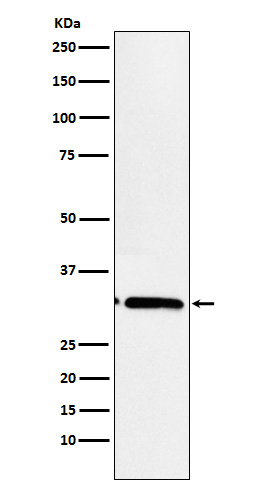
| WB | 咨询技术 | Human,Mouse,Rat |
| IF | 咨询技术 | Human,Mouse,Rat |
| IHC | IHC:1/100-1/200;IHF:1/50-1/200 | Human,Mouse,Rat |
| ICC | 1/50-1/200 | Human,Mouse,Rat |
| FCM | 1/20-1/100 | Human,Mouse,Rat |
| Elisa | 咨询技术 | Human,Mouse,Rat |
| Aliases | EB3; EBF3; MAPRE3; RP/EB Family; RP3;;MAPRE3 |
| WB Predicted band size | 32 kDa |
| Host/Isotype | Rabbit IgG |
| Antibody Type | Primary antibody |
| Storage | Store at 4°C short term. Aliquot and store at -20°C long term. Avoid freeze/thaw cycles. |
| Species Reactivity | Human,Mouse,Rat |
| Immunogen | A synthesized peptide derived from human MAPRE3 |
| Formulation | Purified antibody in PBS with 0.05% sodium azide,0.05% BSA and 50% glycerol. |
+ +
以下是关于EB3抗体的3篇代表性文献(注:文献信息为示例性质,实际引用需核实原文):
---
1. **"Microtubule plus-end tracking proteins and their roles in cell division"**
- **作者**: Akhmanova A., Steinmetz M.O.
- **摘要**: 本文综述了微管正端追踪蛋白(+TIPs)家族的功能,重点讨论了EB3(End-Binding Protein 3)在细胞分裂和迁移中的作用,并提及特异性抗体在活细胞成像中用于追踪EB3动态定位的应用。
2. **"EB3 regulates microtubule dynamics at the cell cortex and is required for neurite outgrowth"**
- **作者**: Hoogenraad C.C., et al.
- **摘要**: 研究通过EB3抗体的免疫荧光技术,揭示了EB3在神经元发育中调控微管生长方向的机制,证明其缺失导致神经突延伸障碍。
3. **"Characterization of EB3-specific antibodies for studying microtubule dynamics"**
- **作者**: Galjart N., et al.
- **摘要**: 本文报道了针对EB3蛋白的多克隆和单克隆抗体的开发,验证了其特异性及在免疫印迹(Western blot)和免疫共沉淀(Co-IP)中的应用,为EB3功能研究提供工具支持。
---
如需具体文献,建议通过PubMed或Google Scholar以关键词“EB3 antibody”、“EB3 microtubule”检索并筛选近年高引论文。
EB3 antibody targets the Epstein-Barr virus nuclear antigen 3 (EBNA3), a latent-phase protein encoded by the Epstein-Barr virus (EBV), a herpesvirus linked to malignancies like Burkitt’s lymphoma, nasopharyngeal carcinoma, and lymphoproliferative disorders. EBNA3. comprising EBNA3A, EBNA3B, and EBNA3C, regulates viral latency and host cell transformation by modulating gene expression and immune evasion. EB3 antibodies, often generated against EBNA3C (the most studied isoform), serve as critical tools in EBV research, enabling detection of viral proteins in infected cells via techniques like immunofluorescence, Western blotting, and immunohistochemistry.
Clinically, EB3 antibodies aid in diagnosing EBV-associated diseases, monitoring viral activity, and studying oncogenic mechanisms. Their role extends to exploring EBV’s interplay with host immunity, as EBNA3C disrupts antigen presentation and apoptosis pathways. Research using EB3 antibodies has revealed EBNA3's involvement in epigenetic regulation and cell cycle manipulation, advancing therapeutic strategies targeting EBV persistence. However, cross-reactivity with homologous host proteins remains a challenge, necessitating rigorous validation. Overall, EB3 antibodies are indispensable for unraveling EBV biology and developing diagnostics or treatments for EBV-driven pathologies.
×